ADSactly Literature: For the Love of Cult Authors: Hunter S. Thompson
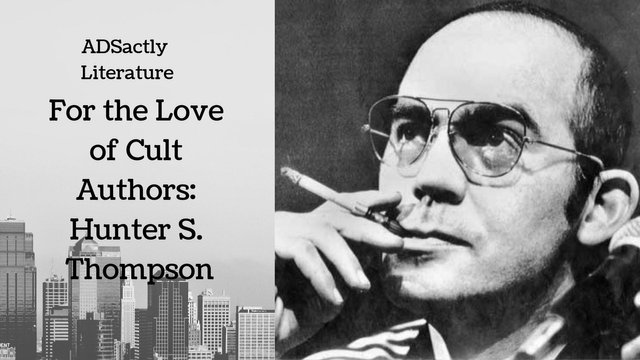
What exactly is a “cult author”? Not someone who writes about cults, certainly, but rather a writer who had (either during his lifetime or posthumously) gathered a cult following – squadrons of rabid fans re-reading his or her books over and over and quoting them to anyone who’s willing to listen.
It’s tricky to define exactly what makes a cult book, but chances are you’ll know when you read one. It’s often something obscure, because our society is obsessed with the strange and quirky. A cult author often comes at ya from the fringes of society, they write about the subcultures, about the downtrodden, about the underground. They represent that world you’d kinda like to inhabit, but are often too scared to do so. And often enough, they become the fascination of a lifetime.
In this new @adsactly series, we’ll be taking a look at several “cult authors” who mesmerize audiences well after their deaths. And because it seems impossible to write up a series on cult authors without mentioning him, we now turn to the uniquely gonzo life of Hunter S. Thompson.
According to Thompson, to get into the mind of a great author, one must first write like the great author. And I do mean like him. Hunter S. Thompson, a huge F. Scott Fitzgerald and Hemingway fan, is said to have spent hours typing out pages of The Great Gatsby and A Farewell to Arms, in order to learn about their writing style, get inside their minds.
“Amazingly it's like music. And from typing out parts of Faulkner, Hemingway, Fitzgerald—these were writers that were very big in my life and the lives of the people around me—so yeah, I wanted to learn from the best I guess."
Nowadays, I imagine many young writers are sitting at their computers, typing out pages of Fear and Loathing in Las Vegas, Hunter’s most famous work. Such was his impact, both on journalism and literature, that many of today’s popular authors can trace their way back to Thompson, at least to some extent.
But who was Hunter S. Thompson?
Well, we can say he was a Kentucky man named for a very famous Scottish doctor. We can say he was a teenage thief. We can say he was half an orphan. We can say he was a drug addict. We can say he was a revolutionary in the world of journalism. And we wouldn’t be wrong.
Born in a relatively poor family and losing his father at a young age, Hunter began a lifelong relationship with alcohol and cigarettes, which led him down a slippery path of petty robberies. Which left him with a choice. After being convicted (again), the young Thompson was presented with a choice – either he go to jail or join the military. Ever one for adventure, Thompson joined the Air Force, but never got to actually fly. During his brief stint in the military, Thompson also worked his first journalistic job as sports editor (unofficially, since servicemen were prohibited from holding down a job). In 1957, at the age of 20, he got an early honorable discharge with the comment:
"Sometimes his rebel and superior attitude seems to rub off on other airmen staff members."
From there, he went on to break the world of journalism, unintentionally drug monkeys, run with bad bikers, all in a haze of cocaine and alcohol.
Thompson’s first big journalistic break came in 1965 when he wrote a short piece for The Nation magazine about outlaw motorcycle gangs, such as the Hell’s Angels. The piece was so well-received that several people wondered if he could sustain the idea over the course of an entire book.
And Hunter, never one to turn down a challenge, did exactly that. For the next year, he “infiltrated” the Oakland chapter of the Hell’s Angels, drinking with them, riding with them, basically living the outlaw biker life and setting down the foundation for his staple gonzo journalism.
That should tell you what a true badass the guy was, given that the Hell’s Angels were highly feared in those days and had a long, long list of accusations for various criminal charges. Thompson fell out with the Angels, though the reason for the rift is unclear – some say the Angels hated the popularity Thompson was getting from his association with them and wanted a cut of the money, while others claim the rift was a result of Thompson lecturing one of the Angels who was beating his wife. To not only live with the Angels, but to dare lecture and actually threaten them? Just part of the incredible legend that is Hunter S. Thompson’s life.
It should be mentioned his association with the Angels culminated with Thompson being savagely beaten by the club members. And also, with the publication of his first novel, Hell's Angels: The Strange and Terrible Saga of the Outlaw Motorcycle Gangs.
In short, Thompson got exactly what he’d set out to get.
The next big moment in Thompson’s career came in 1970, when Scanlan’s Monthly published his piece, The Kentucky Derby Is Decadent and Depraved, now commonly accepted as the birthplace of gonzo journalism.
A quick explanation on gonzo journalism. For a long, long time, journalists were trained and advised to write their pieces as objectively as possible. The journalist himself was only meant to be an objective observer, a ghost whose existence wouldn’t influence the material in any way. That is, until Hunter S. Thompson came along and changed everything. His off-the-wall articles were very much personal, he often cast himself as one of the main characters of the piece and related the events from his own point of view and in relation to his character. Unheard of in the world of journalism.
It was Thompson’s good friend, Bill Cardoso, who coined the phrase. After reading the Derby piece, he wrote to Thompson, saying ‘this is it; this is pure Gonzo.’. It seems Thompson liked the term.
And then came 1971 and with that, the breakthrough of Fear and Loathing in Las Vegas, initially a 2-part article run by Rolling Stone, later published in hardcover. It all started when Thompson was assigned to write an expose about the shooting of Mexican-American journalist, Ruben Salazar. One of his main sources was activist and attorney Oscar Zeta Acosta (Dr Gonzo, in the book). Thompson and Azeta decided to travel to Las Vegas together, for a short piece Thompson was meant to be writing.
Thompson documented the trip in Fear and Loathing, a crazy wild ride fueled by copious amounts of drugs and alcohol. It’s the ultimate road trip, basically the dream of losing yourself. But it’s not just that, it’s also a powerful piece on how, in Thompson’s view, the counterculture movement of the sixties failed, the hippy dream and all that, sadly gone down the drain. It’s a fascinating insight into the dark underside of America.
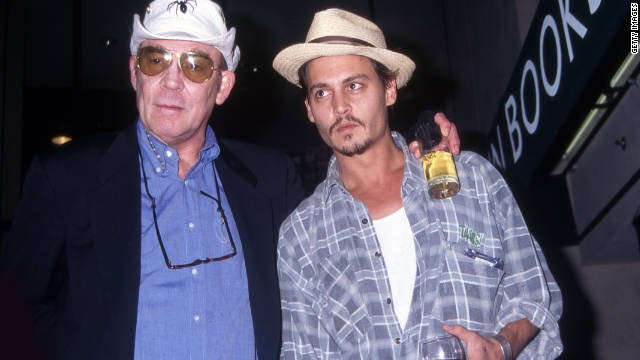
Hunter with Johnny Depp src
Though far less remembered, Thompson followed up with one of his most powerful journalistic pieces ever, when in 1972, he covered the Nixon presidential campaign (he was a bitter critic of Nixon, and that’s putting it mildly) in a piece called ‘Fear and Loathing on the Campaign Trail’.
Sadly, after the publication and huge success of Fear and Loathing, Hunter S. Thompson became more and more reclusive. And more and more drunk. In 1974, he traveled to Africa to cover the monumental fight between Muhammad Ali and George Foreman, which he didn’t actually cover because he was too busy getting drunk in the hotel bar. That stunt lost Thompson a lot of jobs. He continued writing on various topics, from politics to sports, for the rest of his life.
He shot himself at the age of 67, giving rise to a whole wave of conspiracy theories and bitter arguments among fans – several claiming he was in fact murdered. At his funeral, longtime friend Johnny Depp (who played the lead in both Fear and Loathing and The Rum Diary) had Thompson’s ashes shot out of a cannon, as per the writer’s last wishes. I guess it’s safe to say, he went out with a bang.
Legacy
As I mentioned in the beginning, it’s difficult to trace all of Thompson’s influence. Although he is largely remembered for his eccentric persona and drug fueled writing, there was perhaps, an unseen side to Hunter S. Thompson. According to friends, he was deeply concerned with his writing, spent many many hours inside, polishing it until the words looked effortless. They weren’t.
Hunter S. Thompson isn’t just a writing style, it’s not just ‘gonzo journalism and that’s it’. No. It’s a way of life and more importantly, a way of looking at life. He was an advocate of doing things your own way, of questioning everything and being unapologetic.
Sure, he took more drugs than is humanly possible to imagine. Sure, he spent a good chunk of his life drunk out of his mind. But I think it’s worth remembering, there was more to it than that.
Thompson inspired countless young journalist/writer wannabes, who think all it takes to write like the great man himself is an LSD-bender. It’s not. It’s not what’s needed to have a drastically unique view of the world, either.
Let’s assume that you think you have a choice of eight paths to follow (all pre-defined paths, of course). And let’s assume that you can’t see any real purpose in any of the eight. THEN— and here is the essence of all I’ve said— you MUST FIND A NINTH PATH.
Hunter S. Thompson’s Letter on Finding Your Purpose and Living a Meaningful Life
Authored by @honeydue
References: Wiki; Hunter S Thompson: How we need the godfather of gonzo today...; 8 Gonzo Facts About Hunter S. Thompson; The Hunter S. Thompson You Don't Know
Click on the coin to join our Discord Chat

Witness proposal is here:
Go To Steem Witness Page
In the bottom of the page type: adsactly-witness and press vote.

Use small letters and no "@" sign. Or, click here to vote directly!
Thank you!

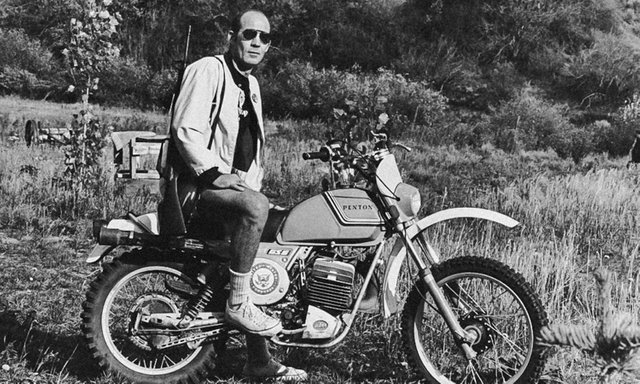
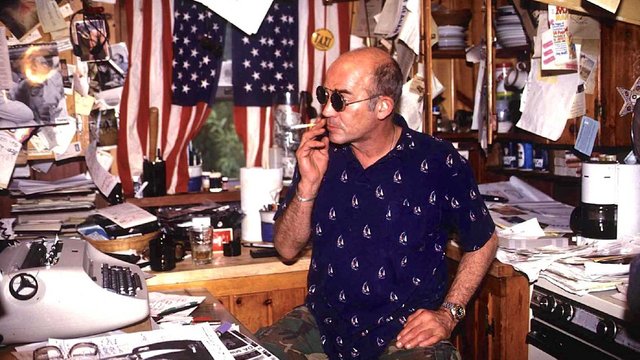
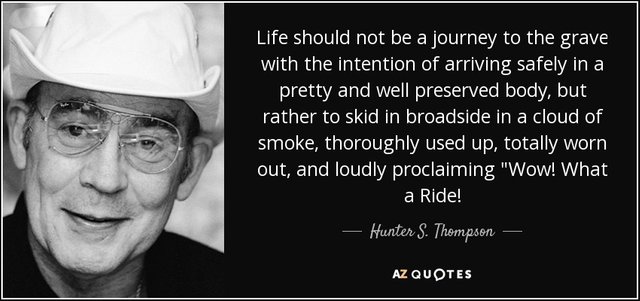
Thompson was the main reason why I became a journalist! So yeah, he had a major influence on me and my life with his work and life.
Awesome article, resteemed!! I love HST, one of my favorite authors of all time. He created something new and that something will never quite be replicated in the literary world.
Nice article, am inspired been one of your followers. Though am new here, but its never been bored being around here... @adsactly 🙌
Another author I know through this series, @honeydue. I've heard more about Hunter S. Thompson the Man Writer than his work. Sometimes it happens with some authors who become almost characters and their real lives are more interesting than the fictitious lives they invent. The fact that Hunter accidentally created one of the most used forms of journalism and that is the use of the anecdote and the first person, speaks of a lot of ingenuity, but also of an admirable capacity for improvisation. It's a pity that like many writers, among the vices and illnesses, he ended his life. Thank you for sharing, @honeydue.
the intricacies of the life of Hunter S. Thompson are able to make a mirror for us. A human being with adventure and chirping is full of pleasant "madness." As a writer he manages to anesthetize the reader and enjoy a very natural story. In his perfect life bridging modern journalism with literature. I feel this is a perfect form of collaboration between souls. writer and adventurous spirit. And you describe it well.
thank you @honeydue
Thank you @adsactly
Thank you Steemit
Warm regard from Indonesia
Your post informs us very well about this individual (almost a character) who knew how to combine those two great fields of writing: literary creation and journalism. I believe that in him he is nourished by the former; hence perhaps the decisive incorporation of the subjectivity of the journalist who acts as a narrator, witness or protagonist. A very intense life, like other American writers from the second half of the 20th century onwards, of whom you have introduced us to several. Thank you for your magnificent work, @honeydue.